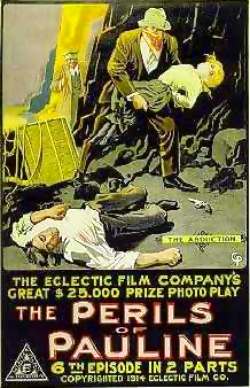 Poster for The Perils of Pauline (1914)
Poster for The Perils of Pauline (1914)
A melodrama in a more neutral and technical sense of the term is a play, film, or other work in which plot and action are emphasised in comparison to the more character-driven emphasis within a drama. Melodramas can be distinguished from tragedy by the fact that it is open to having a happy ending.
The term literally means "music drama" with music being used to increase the emotional response or to suggest characters. There is a tidy structure or formula to melodrama: a villain poses a threat, the hero escapes the threat (or rescues the heroine) and there is a happy ending. In melodrama there is constructed a world of heightened emotion, stock characters and a hero who rights the disturbance to the balance of good and evil in a moral universe.
In recent decades the term has taken on pejorative connotations.
Relating to Music
By the end of the 19th century the term melodrama had nearly exclusively narrowed down to a specific genre of salon entertainment: more or less rhythmically spoken words (often poetry) - not sung, sometimes more or less enacted, at least with some dramatic structure or plot - synchronised to an accompaniment of music (usually piano). It was looked down on as a genre for authors and composers of lesser stature (probably also the reason why virtually no realisations of the genre are still remembered). This was probably also the time when the connotation of cheap overacting first became associated with the term. As a cross-over genre mixing narration and chamber music it was eclipsed nearly overnight by a single composition: Schoenberg's Pierrot Lunaire (1912), where Sprechgesang was used instead of rhythmically spoken words and which took a freer and more imaginative course regarding the plot prerogative.
A few musicals and operettas contain melodramas in this sense of music played under spoken dialogue, for instance, Gilbert and Sullivan's Ruddigore (itself a parody of melodramas in the modern sense) has a short "melodrame" (reduced to dialogue alone in many productions) in the second act[1]; Jacques Offenbach's Orpheus in the Underworld opens with a melodrama delivered by the chararacter of "Public Opinion"; and other pieces from operetta and musicals may be considered melodramas, such as the "Recit and Minuet"[2] in Gilbert and Sullivan's Sorcerer. In musicals, several long speeches in Lerner and Loewe's Brigadoon are delivered to the accompaniment of rather beautiful, evocative music.
In a similar manner, Victorians often added "incidental music" to a pre-existing play, adding background music under the dialogue. This type of often lavish production has mostly been relegated to film (see film score) due to the cost of hiring an orchestra, though ubiquitous in film. Modern recording technology is producing a certain revival of the practice in theatre, but not on the former scale.
A particularly complete version of the older form, Sullivan's incidental music to Tennyson's The Foresters is available online[3], complete with several melodramas, for instance, No. 12 found here.[4].
The John Williams' score to Star Wars, and Korngold's score to The Adventures of Robin Hood are excellent examples of the modern usage.
Current use
- Salty Sam was tryin' to stuff Sweet Sue in a burlap sack.
- He said, "If you don't give me the deed to your
ranch, I'm gonna tie you to the railroad tracks!"
- ---Along Came Jones, by The Coasters
Melodrama is ubiquitous on television: it is evident, for example, in a long series of TV movies about diseases or domestic violence, or the large number of hour-long television programs about lawyers, police officers, or physicians.
Issues melodrama is a subspecies of melodrama in which current events or politics are given a dramatic treatment, hoping to use some recent crime or controversy as a vehicle to draw an emotional response from the viewer. The usual method is to involve lawyers, police officers, or physicians, who can then make speeches about the crime or controversy being dramatized. By this artifice, the dramatist seeks to engage the audience's recently refreshed sense of fear or moral disapproval, while simultaneously maintaining the posture that the drama so produced is timely and socially engaged.
Action melodrama is another subgenre of melodrama that is particularly prevalent in the action Hollywood film blockbuster. An athletic action hero is pitted against an evil villain, and through a bevy of fights, car chases, love scenes and splatter, the hero overcomes the villain and restores the balance of good in the universe. This subgenre often includes a heroine who fights and loves with the hero. Sylvester Stallone and Arnold Schwarzenegger are examples of the stars of these action melodramatic flicks.
Informal use / Slang Casual use of the word as an adjective translates to exaggerated emotions or ways in expressing oneself. For example: "Don't be so melodramatic!" This has fallen into common parlance.
See also
Categories: Drama | Film theory




 216.73.216.133
216.73.216.133 User Stats:
User Stats:
 Today: 0
Today: 0 Yesterday: 0
Yesterday: 0 This Month: 0
This Month: 0 This Year: 0
This Year: 0 Total Users: 117
Total Users: 117 New Members:
New Members:
 216.73.xxx.xxx
216.73.xxx.xxx
 Server Time:
Server Time: